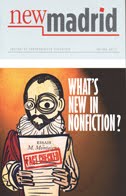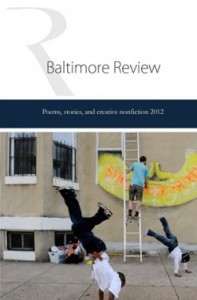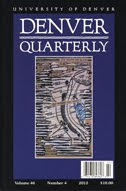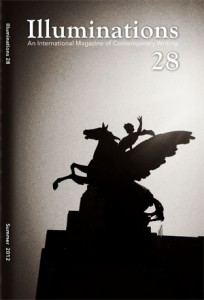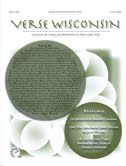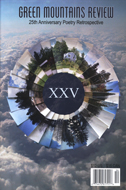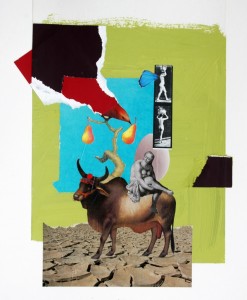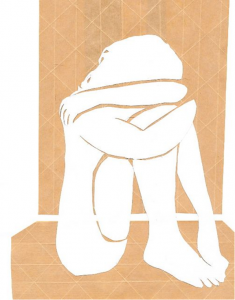In May of this year, my pregnant daughter’s friend lost a baby two weeks before its due date. My daughter sobbed the news to me via cell phone, gasping, “I feel so guilty that I’m still pregnant!” Five weeks later, two days after she gave birth to a healthy girl, I dismounted badly from a horse; my blown knee collapsed under me, and I knew, horribly, that my grandmothering summer was over, faded into surgery and rehab. Continue reading “The Examined Life – Spring 2012”
NewPages Blog
At the NewPages Blog readers and writers can catch up with their favorite literary and alternative magazines, independent and university presses, creative writing programs, and writing and literary events. Find new books, new issue announcements, contest winners, and so much more!
Fox Cry Review – 2011
I have a soft spot for university literary journals. Maybe it’s because I have a closer connection to these folks because I was a college student not too long ago and know what it’s like to wade through the slush pile in a tiny room at night with only a Snickers bar to keep me going. Continue reading “Fox Cry Review – 2011”
Spread the word!
Garbanzo – 2012
Garbanzo is out to break some rules. I find this refreshing in the relatively staid world of literary magazines. Perhaps it’s my background in zine publishing that makes me sympathetic to those willing to buck the trends. First of all, this inaugural issue comes handsomely clothed in a silkscreened dust jacket. How many lit mags have you seen lately with a dust jacket, silkscreened or not? That’s what I thought. Garbanzo is also bound with fancy rivets and includes an attached ribbon bookmark (a thoughtful and handy feature). On the inside there are a few fold-out pages, and even some handwritten poems that nicely break up the otherwise printed text. So, this is a nice-looking publication, a labor of love. I can’t help wondering how long the editors will be able to maintain this level of quality for their limited run print editions (they also publish a digital version), but I will suspend my doubts for now. Continue reading “Garbanzo – 2012”
Spread the word!
The Gettysburg Review – Summer 2012
Sometimes we look to the canon for context: the depression era philosophies and legacies of John Steinbeck, Thomas Wolfe, Pearl S. Buck. Would an American imagination have been materially different absent James Hilton, Sinclair Lewis, Edna Ferber? What if the novels of A.J. Cronin or William Faulkner remained galleys buried on the literary cutting room floor? I approached my reading of this issue of The Gettysburg Review with the canon as context; that is, does the literature in a climate of economic downturn answer similarly situated voices from the dustbowl terror of the mid 1930s? Not exactly. The truth may lie in other comparisons—perhaps an awareness of the hysterical faith-based tomes that characterized the literature of the climax of the Roman Empire, the deoxyribonucleic acid of other revolutions, a monk’s blood. In sum, I found The Gettysburg Review to stand on its own, neither an answer nor echo of the past but rather a collection of talented men and women who have unique stories to tell. Continue reading “The Gettysburg Review – Summer 2012”
Spread the word!
The Hampden-Sydney Poetry Review – Winter 2011
A good poetry journal is like one of those good coffee-table photography and art books. You can open them to any page and find something so thought-provoking that you are carried away and forever changed (NOTE: This is one great challenge of a paperless world). The editors of the Hampden-Sydney Poetry Review have certainly accomplished this. HSPR has been around for more than thirty years and has had just two editors. Since 2008, the review’s second editor, Nathaniel Perry, has done an excellent job of picking up where Tom O’Grady, the founding editor, left things when he retired. In the past, The Hampden-Sydney Poetry Review has published the work of a Nobel Laureate, several Pulitzer Prize and National Book Award winners, and two U.S. Poet Laureates. Continue reading “The Hampden-Sydney Poetry Review – Winter 2011”
Spread the word!
International Poetry Review – Spring 2012
Several of the poets included in this survey of “Voices in German” were familiar to me. The Expressionist Ernst Stadler, killed in battle in World War I, is represented by three evocative landscapes translated by Martin Sheehan and William Wright. Gertrud Kolmar, who disappeared in the Holocaust, mourns a child “(n)ot born because of my sins.” Her moving poem “Fruitless” is translated by Sandra Dillon. Continue reading “International Poetry Review – Spring 2012”
Spread the word!
Michigan Quarterly Review – Spring 2012
An inherent complication arises when writers (or editors or critics) consider the meaning of “place” in literature. It’s certainly true that an author is influenced by the geography and communities that shaped him. It’s equally true on another level that people are the same all over, filled crown to toe with the same hopes and fears. This issue of the Michigan Quarterly Review contains pieces that are accented by the flora and fauna and hardy inhabitants of the Great Lakes region. The contributors indeed communicate the unique feeling of being lost in the Minnesota prairie while tapping into the pathos that unites us all. Continue reading “Michigan Quarterly Review – Spring 2012”
Spread the word!
New England Review – 2012
I can’t speak for anyone else, but the New England Review represents so much of what I hope to be when I grow up. In addition to choosing high-quality fiction, poetry and creative nonfiction to represent the present and future of literature, the New England Review also features scholarly material that puts the writing of the past into context. Continue reading “New England Review – 2012”
Spread the word!
Open Minds Quarterly – Winter 2012
Open Minds Quarterly, whose subtitle is “The poetry and literature of mental health recovery,” is a welcome contribution to the growing body of discourse by and about “consumer/survivors of mental health services.” OMQ is a project of the Northern Initiative for Social Action (NISA) based in Ontario, Canada, whose purpose is to “eliminate stigma” by informing “mental health professionals, fellow consumer/survivors, and their family and friends—as well as society at large—of the strength, intelligence, and creativity” of its authors. A small, glossy, 8 1/2 X 11 journal, OMQ is a showcase for persons who have stories to share about mental illness; it’s not a literary feast. But it’s worth reading, and submitting to, especially if your concerns coincide with NISA’s. Continue reading “Open Minds Quarterly – Winter 2012”
Spread the word!
Prairie Schooner – Summer 2012
Although not the leading story in the Summer 2012 issue of Prairie Schooner, Justin Taylor’s “Flings,” is the one that seems the most summery, as it takes place in that in-between time of adjusting to life after graduation, soon after a group of friends leave a “semi-elite liberal arts college” in Ohio. The story follows each of the friends individually, as they make their ways to Portland, Oregon, bumbling through the friendships crossed with the romantic entanglements that define post-collegiate life. Many of the characters are vaguely artsy, with Andy working on an epic novel, and two of the female characters having internships in an experimental film festival, before “rapidly learning the extent to which they had overestimated their interest in experimental film.” Taylor’s writing excellently explores the confusion of this period of life, when one is trying to define one’s self in the world, as well as the narcissism that can come with a headlong pursuit of the arts. He understands the messy, crisscrossed relationships of a tight-knit group of friends right out of college. His writing is tinged with a sense of humor about the overly sincere and serious. Continue reading “Prairie Schooner – Summer 2012”
Spread the word!
Room – 2012
Room’s website describes it as “Canada’s oldest literary journal by, for, and about women. Published quarterly by a group of volunteers based in Vancouver, Room showcases fiction, poetry, reviews, art work, interviews and profiles about the female experience. Many of our contributors are at the beginning of their writing careers, looking for an opportunity to get published for the first time.” Continue reading “Room – 2012”
Spread the word!
Salamander – Summer 2012
They say not to judge a book by its cover, but to be honest, I do it all the time. Of course the work in a journal always ends up speaking for itself, but I’d be lying if I said first impressions didn’t influence the way I approach new lit mags. In this case, between the title and the cover art, Salamander had me feeling a bit uneasy.
Spread the word!
Salt Hill – 2012
The allure of the Spring 2012 issue of Salt Hill starts with an enticing cover, a black and white illustration by Aaron $hunga where a character named “Mr. Rhombus” is told to get ready “to enter Xenocave.” More of $hunga’s graphics detail a fantastical story in the concluding entry in Salt Hill. As if that graphic wasn’t enough of a warning about the kind of fiction contained in this issue, the editors’ note reads, “The twenty-ninth issue of Salt Hill is evidence of how capricious and flimsy our perceived world is, how gray and clouded the separation between phenomenological reality and the science fictions looming behind it. Or in front of it. The fantasies stuck between its dark matter. Either which way, the work in this issue pursues out-there dimensions.” Perhaps because of this dipping into strange avenues, the best work in this edition is the poetry, as well as amazing artwork done in ink on paper by Faye Moorhouse. Continue reading “Salt Hill – 2012”
Spread the word!
Snail Mail Review – Spring 2012
Snail Mail Review prides itself on being a print magazine that maintains “mail-only interaction” with its writers. Interestingly, although this magazine revels in the virtues of print, one main reason that it attains the amount of quality work as it does might be because of its online presence. Although the magazine is amateur-looking (they hope to move from saddle-stitching to perfect-binding soon), Snail Mail Review is professional in the way that it belongs to LinkedIn, has a Facebook page, Gmail address, and many calls for submission on literary websites and blogs. These calls work. In the introduction to this issue, Editor Christine Chesko writes of a gigantic stack of submissions sitting on a chair in Co-Editor Kris Price’s house. Continue reading “Snail Mail Review – Spring 2012”
Spread the word!
Still Point Arts Quarterly – Summer 2012
Perhaps it’s only my personal attention span, but I believe that focused collections of any art can be easily perused and set aside for any number of reasons. A collection of one type of literature or art must be read or looked at one piece at a time and held for reflection. A combination allows for any mood and many returns. Such is the Still Point Arts Quarterly’s summer issue and their idea to showcase their current site exhibit. Continue reading “Still Point Arts Quarterly – Summer 2012”
Spread the word!
THEMA – Summer 2012
A great literary magazine is one that makes you think and ponder and take several moments out of your busy life to just appreciate art and life. Thema offers some absolutely remarkable writing that grabbed me and forced me to sit and reread several times. I found myself thinking about the economy, relationships, writing, reading, art, and even the galaxy at large.
Spread the word!
U.S. 1 Worksheets – 2012
Nearly 50 years ago, a few poets gathered near Princeton, NJ, to read their poems to each other. According to the editors of U.S. 1 Worksheets, this small group of poets formed the U.S. 1 Poets’ Cooperative, and many of the original poets are still involved in the Cooperative and continue to submit to the journal, which is headquartered in the Princeton suburb Kingston, NJ. Continue reading “U.S. 1 Worksheets – 2012”
Spread the word!
Watershed – 2011
Watershed leans in the environmental direction, at least in this issue. Given that it’s a journal celebrating the Susquehanna Watershed, this makes sense. The issue includes poetry, narrative nonfiction, and an oral history focused on contemporary Native Americans living in Pennsylvania, a state that doesn’t currently recognize any existing Indian tribes within its borders (yes, there’s some bitterness there, as expected). Black and white photos dress up the text of this slim volume. Continue reading “Watershed – 2011”
Spread the word!
What’s New in Nonfiction?
In a creative introduction to the nonfiction feature in New Madrid, Editors Lisa Luton and Elena Passarello address the ongoing debate in nonfiction writing—how far from the truth can a writer wander.
The introduction is a dialogue between two characters, Memoir and Essay. At first the two argue. Essay argues that “essayists try to create a new, fully realized contract with each piece of writing, one that is grounded and centered in art rather than proving anything. The trying is what turns us on, and hopefully what turns readers on. Why put art first? Because art is greater than fact.” To which Memoir says, “I think we are the purveyors of the existing, deeper truths of the world. We are not here to make art out of facts, but to find an portray the art that is already there.”
However, as they carry on, they realize that they have a lot in common with each other and that “Maybe nonfiction is about both the trying and the answering, and, just like with a painting, it is the audience’s interpretation of the art that makes the true meaning.” Essay goes on to say that “the greatest thing we can learn from all these submissions is that we nonfictioneers might have core values that go in opposite directions, but there’s enough room under this genre umbrella for all of us.”
This nonfiction feature in New Madrid includes both essays and memoirs—and pieces that perhaps can’t be defined one way or the other. Writers featured include Kim Trevathan, Kirby Wright, Matthew Gavin Frank, Sean Christopher Lewis, Frankie Finley, Briandaniel Oglesby, Sara B. Levi, Vincent Scarpa, Daniel Aristi, John Proctor, Tom Elliot, and Alison Stine.
Spread the word!
Baltimore Review – Summer “Heat” Winners
The Baltimore Review editors have announced the winners of their Summer Issue “Heat” theme contest as selected by Final Judge Jean McGarry, Professor and Co-Chair, The Writing Seminars, Johns Hopkins University. All winning works appear in the Summer Issue online and will appear in the review’s annual print collection in 2013.
First Place
Ann Cwiklinski
“Selkie” – Short Story
Second Place
Moira Egan
“Hot Flash Sonnet” and “Sisters in Sweat Sonnet” – Poems
Third Place
Claudia Cortese
“The field curdles” and “Slippery Banjo” – Poems
Honorable Mention
Jennifer Fandel
“Heat Wave” – Poem
Spread the word!
Podcast :: Jane Borden Interview
Virtual Memories Show is a monthly podcast hosted by Gil Roth about life and books, including interviews with authors about books that have helped shape their lives. The August episode features a conversation with Jane Borden, improv junkie, standup comic, and author of I Totally Meant To Do That (2011), a memoir about how she went from being a North Carolina debutante to a Brooklyn hipster.
Spread the word!
Petition to Save UNO Press
From Marthe Reed, Skip Fox, and Anny Ballardini to all authors, translators, editors, scholars, and readers of fine literature:
As you may well have already heard, the University of New Orleans Press has just recently been put on “hiatus” and its innovative and energetic editor, Bill Lavender, fired. The presumptive reason concerned budget constraints, but in fact the Press was cost free, and gained UNO a significant reputation for the past five years (since Bill Lavender’s tenure). It also published an international range of writers, many of them prize winners or otherwise notable. As you are probably aware, Bill Lavender had taken a rather lifeless creature in 2007 and enlivened it with over 80 publications, a remarkable achievement.
In support of UNO Press, Bill Lavender, fine literature and good reading, please consider signing a petition indicating your support. The petition has many more details concerning the recent (5-6 day) history of events.
Sign the petition here: Petition Site
There was a significant item in The Times Picayune and one in Inside Higher Ed in the past few days, as well as this article in the Chronicle of Higher Education.
You may also wish to pass this information on to other writers through a blog, facebook, etc., or even write personal letters to the President and Provost of UNO:
Provost Louis Paradise
[email protected]
President Peter Fos
[email protected]
Spread the word!
Master Class with Ron Silliman
The Chicago School of Poetics offers online and F2F workshops for writers who “feel the need for more specialized instruction” beyond the traditional academic program.
 Currently offered is a master class workshop with poet Ron Silliman: “’What does not change / is the will to change’ : Embracing transformation in writing poetry”. The one-day (Oct. 20) workshop will run for three hours (1-4pm) in an online, video-conferenced classroom and is limited to ten students.
Currently offered is a master class workshop with poet Ron Silliman: “’What does not change / is the will to change’ : Embracing transformation in writing poetry”. The one-day (Oct. 20) workshop will run for three hours (1-4pm) in an online, video-conferenced classroom and is limited to ten students.
In addition to this master class and weekly salons, online classes offered include Poetics (I, II, & III), Documentary Poetics, Risk: Writing at the Edge, Erasure to Automatism, The Poetry of Cubism, Queer Poetics, Working Poets, Personal Archeology, Publishing, The Poem as Remix, Visual Poetry, and Hybrid Texts.
Spread the word!
Novella Contest Winner: The Malahat Review
In the most recent issue, The Malahat Review publishes Naben Ruthnum’s novella “Cinema Rex” as the winner for the 2012 Novella Contest. His entry was selected from 215 submissions by three judges: Terence Young, Valerie Compton, and Gabriella Goliger. In addition to publication, Ruthnum was awarded $1500 CAD prize money.
Judges said the following about his piece: “[it] incorporates footnotes to explore a different kind of omniscience. The story, set in exotic Mauritius, follows three adolescent boys on the opening day of the town’s newest theatre, Cinema Rex. They skip school when they discover their teacher slumped over on his desk in a drunken sleep, and from there events build to the evening’s entertainment, a translated version of ‘The Night of the Hunter.’ Throughout, the footnotes move us forward in time to the boys’ adult lives, creating a kind of sympathetic cosmic irony. The language of ‘Cinema Rex’ is precise, the tone engaging, and the characters compelling. It has an unstoppable momentum, often surprising details and vivid dialogue. This is a novella that has been pared to essentials, with every element working together.”
A web exclusive interview with Ruthnum about his prize can be found here.
Spread the word!
Editor Changes: Denver Quarterly
In the current issue of Denver Quarterly, Editor Bin Ramke announces the issue as his last as editor. After serving for seventeen years, he expresses his gratitude for the writers over the years.
“It can be an enormous amount of work to publish a literary journal four times per year,” he says in his editor’s note, “but when that work is shared it can also be a joy, and it was. I trust that joy will be part of Laird Hunt’s experience as he negotiates the burdens and opportunities of editorship, and I know he will renew the energy of the Denver Quarterly as he guides it toward and past its fiftieth year.”
Spread the word!
American Life in Poetry
American Life in Poetry provides individual readers, newspapers and online publications with a free weekly column featuring contemporary American poems. The sole mission of this project is to promote poetry: American Life in Poetry seeks to create a vigorous presence for poetry in our culture. There are no costs for reprinting the columns; they do require that you register your publication on their site and that the text of the column be reproduced without alteration. Below is the most recent column, with introductory comments from Ted Kooser.
******************************
American Life in Poetry: Column 385
BY TED KOOSER, U.S. POET LAUREATE
I am very fond of poems that don’t use more words than they have to. They’re easier to carry around in your memory. There are Chinese poems written 1300 years ago that have survived intact at least in part because they’re models of succinctness. Here’s a contemporary version by Jo McDougall, who lives not in China but in Kansas.
Telling Time
My son and I walk away
from his sister’s day-old grave.
Our backs to the sun,
the forward pitch of our shadows
tells us the time.
By sweetest accident
he inclines
his shadow,
touching mine.
American Life in Poetry is made possible by The Poetry Foundation, publisher of Poetry magazine. It is also supported by the Department of English at the University of Nebraska-Lincoln. Poem copyright ©2001 by Autumn House Press. Jo McDougall’s most recent book of poems is Satisfied with Havoc, Autumn House Poetry, 2004. Poem reprinted from The Autumn House Anthology of Contemporary American Poetry, 2nd ed., 2011, by permission of Jo McDougall and Autumn House Press. Introduction copyright © 2012 by The Poetry Foundation. The introduction’s author, Ted Kooser, served as United States Poet Laureate Consultant in Poetry to the Library of Congress from 2004-2006. We do not accept unsolicited manuscripts.
Spread the word!
New Editor :: Illuminations
The new issue of Illuminations marks the first issue for new Editor Meg Scott Copses. “In this first year as new editor,” she says, “there are many moments of blinking cursors, and quite a few question marks penciled in as my editorial team has worked to launch a new website and boost subscriptions and general readership for Illuminations. The component that remains more certain, that feels right, is the poetry itself, and the integrity of the poets who craft the lines that get sent my way. It has been such a sincere pleasure to read and correspond with this year’s contributing writers.”
And with a new editor comes changes to the way the magazine is run. Traditionally, the magazine has “published all work by a single author on adjacent pages.” With this issue, the poems are organized loosely into five larger themes or groupings: Speak, Season, Desire, Portrait, and Place. “A photograph by Lisa Scott Jones introduces each section,” says Scott Copses, “and while the photograph isn’t meant to represent anything literal about the poems in that section, I hope contributing writers will enjoy considering her photography alongside their own work. I hope also that the new arrangement fosters a conversation between poems and poets. My assistant editor and I have so enjoyed the many moments of resonance we discovered in arranging the magazine this way.”
Spread the word!
Winners of Logline Contest
In the most recent issue, Vine Leaves Literary Journal announced the winners for the Logline Contest in which writers submitted the logline for their current novel. Winners receive free critiques from publishing experts and a one-year subscription to WritersMarket.com.
First Place: Lynn Hartzer
In a future society where men are extinct, the last born clone must follow her sister back through time to find the perfect 21st Century specimen to help repopulate the world.
Second Place: Taffy Lovell
Angelica remembers nothing about the deaths of her nine best friends, even though she was there for each of them.
Third Place: Elizabeth White
Every teacher has a fish story about working for a psychotic principal. Annie Smart’s is true.
Spread the word!
Open Minds Quarterly Contest Winners
Open Minds Quarterly announces and publishes the winners of their tenth annual BrainStorm Poetry Contest in the current issue.
First Place
D. Brian Anderson: “To Sylvia Plath”
Second Place
Donald W. Boyles: “To My Father”
Third Place
Kristina Morgan: “Excerpt from Shade“
Honorable mentions Andrew Boden, April Bulmer, and D. Brian Anderson will have their work published in the Fall 2012 issue.
“This year’s BrainStorm Poetry Contest,” say the editors, “is dedicated in greatest appreciation and fondest memory to Ann Morrison, who volunteered her time and passion for many years as one of our contest judges before passing away on Friday, May 25, 2012. Thank you, Ann. Your presence and insight will be very missed.”
Spread the word!
Verse Wisconsin Changes
Verse Wisconsin announces, in their most recent issue, that it will be the last summer issue printed. Starting in 2013 they will move to a biannual cycle, to be published in fall and spring. “This change will allow us to pay some attention to our press, Cowfeather, not to mention enjoy a few more summer evenings with our families and friends,” say Co-Editors Sarah Busse and Wendy Vardaman. “As much as we’re looking forward to publishing a few more books each year, we will miss sending out this gift of verse and voice to you each midsummer.”
They say that this last issue focuses on community, saying that they imagine that the poems “form their own sort of community of voices, which will thread its way through your summer days.” An online version of this issue features “brief essays by poets describing their various communities and community-oriented projects” as well as poems excerpted from the 2013 Wisconsin Poets’ Calendar, published by the Wisconsin Fellowship of Poets, “an organization that exists primarily to create community among poets across the state.”
Spread the word!
Anniversary Issue: Green Mountains Review
Green Mountains Review celebrates its 25th anniversary with a retrospective poetry issue. The issue not only includes poetry from the past 25 years but also commentary from more than half of the writers about what inspired their work and how the response to it had changed over time.
“How enlivening, enlightening (and exhausting!) to read back through almost 50 issues of Green Mountains Review in search of the best poems, interviews, and essays on poetry to be published in the past quarter-century,” says Senior Editor Neil Shepard. “And then came the difficult task: to pick and choose among the thousands of texts the 100-plus I could truly not resist, those pieces gathered here in GMR’s 25th Anniversary Retrospective issue.”
“Reading back through a quarter-century’s worth of literature,” he says, “I admire both the poems that shape, challenge, or unsettle their time, as well as the poems that assimilate, distill, and crystallize the experiments of the past; I hope they’re all brilliantly on display in GMR’s 25th Retrospective Anniversary on poetry.”
Included in this issue is poetry from David Wojahn, David St. John, David Mura, Larry Levis, Mark Doty, Molly Peacock, H.L. Hix, Dara Wier, G.C. Waldrep, Russell Edson, Peter Johnson, Paul Hoover, Quan Barry, Barbara Hamby, Laura Kasischke, Sherman Alexie, Melissa Stein, Robert Hill Long, and many more.
Spread the word!
Best of the Net Call for Submissions
 |
Sundress Publications has opened submissions the seventh volume of the Best of the Net Anthology: “The internet continues to be a rapidly evolving medium for the distribution of new and innovative literature, and the Best of the Net Anthology aims to nurture the relationship between writers and the web. In our first six years of existence, the anthology has published distinguished writers such as Claudia Emerson, B.H. Fairchild, Ron Carlson, Dorianne Laux, and Jill McCorkle alongside numerous new and emerging writers from around the world.”
Submissions must come from the editor of the publication (journal, chapbook, online press, etc), or, if the work is self-published, it must be sent by the author. Submissions must be sent by September 30th, 2012.
Full submission guidelines can be found here.
Sundress Publications also announced that this year will mark the first year they will also be publishing an e-book (completely free) of the anthology as a compendium to the online anthology.
[Artwork: Cover image for the 2011 Best of the Net online publication by Rhonda Lott.]
Spread the word!
Lyric Novella
Lyric Novella, by Swiss writer Annemarie Schwarzenbach, was published in 1933. The novella is slim. This edition, translated by Lucy Renner Jones, adds more weight with a translator’s introduction and an afterword that examines Schwarzenbach’s life and literary influences. I wanted, first, to let this lyric of youth and obsessive love stand on its own, to be convinced by the writing rather than be influenced by all the interpretation. Continue reading “Lyric Novella”
Spread the word!
Inferno
As far as serious, professional literary translation goes, Mary Jo Bang’s Inferno tests the boundaries of acceptability. Just how far afield from the original text the translator may venture yet still be found to be arguably holding true to the original is relentlessly challenged. Bang contends that since “Dante paid homage to poets and figures who meant something to him and to his readers; he appropriated stories once told by Virgil, Ovid, Lucan, and sometimes adapted them to suit his purposes,” her translation likewise will “include, through allusion, some of the poets and storytellers who have lived and left a mark in the time since Dante wrote.” Continue reading “Inferno”
Spread the word!
Chinoiserie
The lush and tactile imagery of Chinoiserie overwhelms the senses to invigorate a poetic world full of objects, people, and places. Spanning cities and centuries, Karen Rigby’s debut collection and winner of the Ahsahta Press 2011 Sawtooth Poetry Prize enraptures the reader through vivid and carefully rendered description, from flowers to fabrics to street scenes. A noteworthy collection of free verse engaged in shape and line, Chinoiserie enthralls throughout each poem, always connected to the senses. Continue reading “Chinoiserie”
Spread the word!
My Life as Laura
Kelly Ferguson’s book chronicles the two weeks she spent retracing the pioneer journey of Laura Ingalls Wilder. The book opens in an antique clothing and costume shop in Missoula, Montana, where Ferguson buys her outfit for the trip: a floor-length bright blue flowered dress, the closest available facsimile of a prairie dress Laura would have worn. To explain her decision to make this journey, Ferguson reveals that she’s been obsessed with Laura since her mother gave her the yellow-covered Harper Trophy Edition box set of Laura Ingalls Wilder’s books for her sixth birthday. Ferguson not only reads the books, she immerses herself in them; she carries the characters around in her head like imaginary friends. Continue reading “My Life as Laura”
Spread the word!
The Children
Hornets, locusts, bees, trees, the heart: recurring images bring us into the river, the river we ride inside us in Paula Bohince’s The Children. Bohince spares children no respite due to young age in “Pussy Willow”: Continue reading “The Children”
Spread the word!
Messages
Piotr Gwiazda’s Messages includes twenty-two poems (some of which are cycles of three to seven parts) and an interview with the author. The collection opens with a quotation from Joe Milutis’s Ether: The Nothing That Connects Everything, which describes “materialist interpretations” as “poor readings of rationality.” Gwiazda’s very first poem elaborates this theme further, by expanding poetry’s cognitive domain to “anything, anything”; whereas the poet’s task is “to translate the anything”—in other words, to show things’ true significance, as this excerpt demonstrates: “You think this is freedom, / but it’s a Chinese toy.” Continue reading “Messages”
Spread the word!
Surrender When Leaving Coach
“You’re reading the poems of a man,” Joel Lewis offers in Surrender When Leaving Coach, “who feels all the time / . . . like he’s rooting about / in the ruins of a cheap Pompeii.” Pompeii, for Lewis, is the familiar bus line along Staten Island’s Port Richmond Avenue that he will return to throughout the book, among the other well-worn routes he will cull for the daily strange, the repetitive, the hilarious, and the ephemeral. “Once again my obsession with / the motion of buses, trains and canal boats,” Lewis notes in the title poem of the collection, named for the instructions printed on the old bus tickets of his New Jersey youth. These poems look to the past even as the trains in them lumber to their stations on schedule. “In an absolute theater of time,” Lewis says, “everything happens at once.” Continue reading “Surrender When Leaving Coach”
Spread the word!
People Are Strange
If Surrealists told stories around the campfire, they might do well to bring a copy of Eric Gamalinda’s new book of short fiction, People Are Strange. Here is a collection that contains a swath of wide-ranging episodes that take the reader through a gamut of emotions, not the least of which is surprise. Continue reading “People Are Strange”
Spread the word!
The Planets
The Planets, by Argentinian-born writer Sergio Chejfec, is a go-with-the-flow novel that blends the characters walking the streets of Buenos Aires with a contemplation of several subjects like dreams, friendship, memory, and the mysteries in life. What little plot there is involves a friendship between M and the narrator. M is an innocent during the turbulent time of Argentinian political abductions and executions. Living next to the train tracks, M is abducted, disappears, and then is presumably killed by an explosion, which the narrator hears. Continue reading “The Planets”
Spread the word!
Doll Studies
Doll Studies: Forensics, a collection of tightly woven prose poems, investigates a series of crime scene dioramas portrayed with dolls and doll sets. A strong, questioning voice describes and comments on each diorama from various perspectives, piecing together a narrative built from individual scenes. Through engaging, fine-tuned poems, Carol Guess leads the reader through the dramas and mysteries left behind and reenacted with these dolls, creating a strange yet fascinating glimpse into two artistic mediums playing off one another and commenting on human fault and tragedy. Continue reading “Doll Studies”
Spread the word!
Grants :: Do Something!
Do Something! is “an organization that hopes to inspire, empower, and enable teens to convert their ideas and energy into actions that will improve their communities.”
Do Something! is awarding Seed Grants in the amount of $500 every week to help fund project ideas and programs that are just getting started. These grants can be used to jump-start a program or take a project to the next level. Past grantees have used the money to improve a community-run organic farm, publish a youth-written literary magazine for women of color, and even create an organization that teaches sick kids how to fly.
Eligible applicants must be 25 OR UNDER, a U.S. or Canadian citizen, and have not won a grant from Do Something in the last twelve months. One grant given per week.
Spread the word!
Interview :: Paulette Licitra, Alimentum Magazine
NewPages writer Tanya Alngell Allen had the opportunity to talk with Paulette Licitra, Publisher of Alimentum, which has been in print since 2005 and recently publishing all online. Alimentum includes fiction, creative nonfiction, poetry, book reviews, art, music, featurettes, recipe poems, favorite food blogs and more from writers and creators who live across the US and abroad. Allen talks with Licitra about the shift to online only, the focus of food writing for the journal, and the local Eat and Greet tours hosted by the publication. Read the full interview here.
Spread the word!
No Grave Can Hold My Body Down
Aaron McCollough’s fourth book, No Grave Can Hold My Body Down, is the most ambitious project we’ve seen released by the young author. In this book-length series, each section is titled after the songs on John Fahey’s album America—in fact, if you’ve followed McCollough’s work in recent years you would have seen some of these pieces, or versions of, published in journals as “selections from John Fahey’s America.” The book’s title recalls Johnny Cash, which along with Fahey and mentions of “Little Sadie,” “Tom Dooley,” Charley Patton, and the blues, places this collection squarely in conversation with the American songwriting tradition. Continue reading “No Grave Can Hold My Body Down”
Spread the word!
WANTED: English Lit Web Resources
Contributions solicited for a new web resource on teaching English literature at the college/university level.
Possible contributions include but are not limited to:
Reviews of books, blogs and other resources;
Personal essays on teaching lit at the college/university level;
Sample Assignments and/or syllabi, commentary on successful courses;
Course design and planning ideas;
Incorporating technology successfully;
Hints and advice for new instructors;
Suggestions for links: Do you blog on topics related to teaching college/university-level English literature or edit a journal on a related topic, print or online? What sites are particularly helpful in your course planning and teaching? Please send a link and description.
Queries and suggestions welcome: rpigeon at csusb dot edu
Extended deadline: September 15 for consideration for the initial launch of the site; on-going project, so contributions after that date will also be welcome. Please include a brief bio and contact info.
Spread the word!
Glimmer Train May Short Story Award Winners
Glimmer Train has just chosen the winning stories for their May Short Story Award for New Writers. This competition is held quarterly and is open to all writers whose fiction has not appeared in a print publication with a circulation greater than 5000. The next Short Story Award competition will take place in August. Glimmer Train’s monthly submission calendar may be viewed here.
1st place goes to Michael Deagler of Pipersville, PA [pictured]. He wins $1500 for “Etymology” and his story will be published in the Fall 2013 issue of Glimmer Train Stories, out next August. This will be his first published story.
2nd place goes to Tom Dibblee of Los Angeles, CA. He wins $500 for “Stuck in a Sixth Floor Penthouse” and his story will also be published in a future issue of Glimmer Train Stories, raising his prize to $700. This will be his first print publication.
3rd place goes to Andrew Slater of New York City. He wins $300 for “Whatever Makes You Happy.”
A PDF of the Top 25 winners can be found here.
Deadline soon approaching for the Very Short Fiction Award: July 31
Glimmer Train hosts this competition twice a year, and first place has been increased to $1500 plus publication in the journal. It’s open to all writers, no theme restrictions, and the word count must not exceed 3000. Click here for complete guidelines.
Spread the word!
New Lit on the Block :: Ostrich Review
A new biannual online magazine, Ostrich Review, publishes poetry, fiction, and art. Editor Nayelly Barrios says that the name of the magazine actually came from a vote on the font, which is Sans Ostrich. “But we also happen to like burying our heads in the sand,” she says. Along with Co-Editor Benjamin Sutton, she says they “want to be a part of the literary tradition. Our mission is to publish work that shakes us.”
Barrios says that in Ostrich Review, readers can expect to find “not necessarily backs turned against expectation, but an attempt to display work reaching for the unexpected. We don’t have a specific aesthetic. We don’t want to have one specific aesthetic or style. We deliver diversity (which is evident in our inaugural issue). We deliver the good stuff. No, the amazing stuff.”
The first issue features poetry from Carmen Gimenez-Smith, Carolina Ebeid, Carolyn Hembree, G.C. Waldrep, Jaswinder Bolina, and Rodney Gomez; fiction from Brian Allen Carr, and Patricia O’Donnell; and art from Andrew Spear and Roymieco A. Carter.
Ostrich Review accepts submissions through Submittable year-round; there are no submission deadlines.
Spread the word!
Closings :: Rainy Faye Bookstore (CT)
Rainy Faye Bookstore in Bridgeport, CT has announced it will be closing August 1. Owner Georgia Day cites a number of contributing factors, including lack of support for small/independent businesses in the area as well as “the Great Recession.” As journalist Keila Torres Ocasio comments in her article on the closing: “I’ve written it here before. Downtown businesses can’t succeed without help from residents. They also can’t succeed without support from the city they are located in. Day didn’t feel like she had that kind of support.”
Spread the word!
Visual Poetry :: Andrea Baker
Add some art to your day! Omnidawn Publishing has posted a series of images Visual Poetry: Andrea Baker. The work is excerpted from The Incredibly True Adventures of Me, Baker’s 150-page manuscript made from cutouts and paper packing tape.

